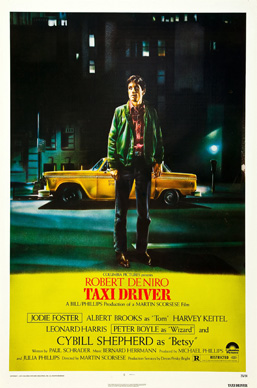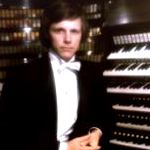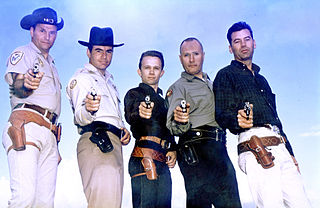
Taxi Driver is a 1976 American neo-noir psychological drama thriller film directed by Martin Scorsese, written by Paul Schrader, and starring Robert De Niro, Jodie Foster, Cybill Shepherd, Harvey Keitel, Peter Boyle, Leonard Harris, and Albert Brooks. Set in a decaying and morally bankrupt New York City following the Vietnam War, the film follows Travis Bickle, a veteran working as a taxi driver, and his deteriorating mental state as he works nights in the city.

Carl William Mays was an American baseball pitcher who played 15 seasons in Major League Baseball from 1915 to 1929. During his career, he won over 200 games, 27 in 1921 alone, and was a member of four World Series-champion teams. On August 16, 1920, Mays threw the pitch that fatally injured Ray Chapman of the Cleveland Indians, the only major league player to die as a direct result of an on-field injury.
Rex Applegate was an American military officer who worked for the Office of Strategic Services, where he trained Allied special forces personnel in close-quarters combat during World War II. He held the rank of colonel.

Practical shooting, also known as dynamic shooting or action shooting, is a set of shooting sports in which the competitors try to unite the three principles of precision, power, and speed, by using a firearm of a certain minimum power factor to score as many points as possible during the shortest time. While scoring systems vary between organizations, each measures the time in which the course is completed, with penalties for inaccurate shooting. The courses are called "stages", and are shot individually by the shooters. Usually the shooter must move and shoot from several positions, fire under or over obstacles and in other unfamiliar positions. There are no standard exercises or set arrangement of the targets, and the courses are often designed so that the shooter must be inventive, and therefore the solutions of exercises sometimes vary between shooters.

Oscar Littleton Chapman was the U.S. Secretary of the Interior, during President Truman's administration, from 1949 to 1953.

Union Jack is the name of three fictional superheroes appearing in American comic books published by Marvel Comics. Created by Roy Thomas and Frank Robbins, the first Union Jack first appeared in Invaders #7. A second incarnation from the same creators appeared in The Invaders #21, and a third incarnation was created by Roger Stern and John Byrne for Captain America Vol. 1 #254.

On the evening of 8 December 1980, English musician John Lennon, formerly of the Beatles, was shot and fatally wounded in the archway of the Dakota, his residence in New York City. The killer was Mark David Chapman, an American Beatles fan who was jealous and enraged by Lennon's rich lifestyle, alongside his 1966 comment that the Beatles were "more popular than Jesus". Chapman said he was inspired by the fictional character Holden Caulfield from J. D. Salinger's novel The Catcher in the Rye, a "phony-killer" who loathes hypocrisy.
Kevin O'Halloran was an Australian freestyle swimmer of the 1950s who won a gold medal in the 4×200-metre freestyle relay at the 1956 Summer Olympics in Melbourne.
Chapman Piloting & Seamanship, published by Hearst Books has been a leading reference book for power and sail boaters for nearly 100 years. Known as "the Bible of Boating", more than 3 million copies have been printed.
The modern technique is a method for using a handgun for self-defense, originated by firearms expert Jeff Cooper. The modern technique uses a two-handed grip on the pistol and brings the weapon to eye level so that the sights may be used to aim at the target. This method was developed by Cooper into a teachable system beginning in the 1950s, based on the techniques of shooters like Jack Weaver, Mike Rousseau and others, after experiments with older techniques such as point shooting. The method was codified in book form in 1991 in The Modern Technique of the Pistol by Gregory B. Morrison and Cooper.

Keith Chapman (1945–1989) was an American concert organist known best for his flair at playing in the symphonic style of organ performance, and particularly for his long and distinguished association (1966–1989) with the Wanamaker's Department Store of Philadelphia as the principal organist of the Wanamaker Organ.

John Harold Weaver was a Los Angeles County Deputy Sheriff and the developer of the Weaver stance, a popular shooting stance for firing handguns.
Billy Ray Hearn was the founder and chairman of the Capitol Christian Music Group the world's largest Christian music label.

Charles Frederic Chapman was an avid boater, editor of Hearst's Motor Boating magazine from 1912 to 1968, co-founder of the United States Power Squadrons, co-founder of the Chapman School of Seamanship and author of the standard boating reference work, Chapman Piloting.

Miroslav "Miro" Šipek is an Australian rifle shooting coach. During his long and successful shooting career he was a champion of Yugoslavia 27 times in a range of disciplines. He won several medals at various international competitions and Balkans Championships, 4 silver medals at European Championships and a bronze at the 1970 World Championships in Phoenix Arizona.

Jeffrey Bowyer-Chapman is a Canadian actor, model, and television personality. He is known for appearances in films and television, most notably as Jay in the Lifetime dark comedy-drama series Unreal (2015–2018) and as one of the main judges on the first season of Canada's Drag Race (2020).
The 1975 IPSC Handgun World Shoot I held at Zürich in Switzerland was the first IPSC Handgun World Shoot, and was won by Ray Chapman of United States using a 1911 in .45 caliber. Ray had been central in the development the sport of practical shooting in the late 1950s. He was seeded as number one before the championship, and shot an almost perfect match dropping only one point. He continued to compete until 1979 when he retired.
The 1976 IPSC Handgun World Shoot II held in Berndorf, Salzburg, Austria was the second IPSC Handgun World Shoot, and was won by Jan Foss of Norway in front of Ray Chapman of United States by a small margin. Foss had been unknown before the championship and did not participate internationally afterwards.
The 1977 IPSC Handgun World Shoot III was held in Salisbury, Rhodesia at the end of August, and was the third IPSC Handgun World Shoot, and was won by Dave Westerhout in front of his Rhodesian teammate and second-place winner Peter Maunder by 116.403 points and third-place winner Raul Walters of United States with further 41.741 points.
Jan Foss was a Norwegian sport shooter from Oslo who became the second world champion in practical shooting in 1976 during the IPSC Handgun World Shoot II in Salzburg, Austria. The favourite ahead of the championship was reigning world champion Ray Chapman from USA, who competed with a 1911-pistol in .45 ACP. Foss took the title with a SIG P210 in 9×19 mm with minor scoring, while Chapman and most of the other competitors shot the .45" caliber with major scoring which was considered an advantage due to the scoring system. The competition was described as being versatile, and Foss shot 379 points which was enough to take the title with a small margin of only four points ahead of Ray Chapman in second place with 375 points (98.94%). Foss had been unknown before the world championship, and did not compete internationally afterwards. He continued to compete locally throughout his career with pistol, rifle and shotgun where he took several medals.











